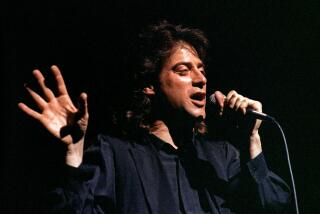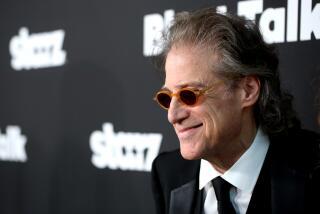Robin Williams’ friends saw signs he was succumbing to depression
- Share via
Reporting from TIBURON, Calif. — The end was shockingly sudden: a belt hung on a door; an assistant’s distraught call to 911. But the road that led to Robin Williams’ apparent suicide at age 63 was a long one — and if you knew where to look, there were plenty of signposts indicating trouble along the way.
In the wake of Williams’ death at his home here Monday, fans around the world have struggled to understand what could have led a man whose thousand-megawatt comic persona had brought so much joy to millions to such depths of despair. But Williams’ closest friends and colleagues knew well that beneath his manic, Technicolor exterior, the actor had battled depression for years.
In recent months — as Williams wrestled with the cancellation of his CBS TV series “The Crazy Ones” and fought to maintain a sobriety that had at times proved fragile — those friends could see that he was losing that fight.
“He started to disconnect,” comedian Rick Overton, a friend of Williams’ since the 1970s, said Tuesday. “He wasn’t returning calls as much. He would send texts and things like that, but they would get shorter and shorter.”
Williams appeared to have died of asphyxia due to hanging, authorities said Tuesday. The actor’s wife, Susan Schneider, had left their home that morning at 10:30. His assistant arrived about an hour later and found him hanging by a belt affixed to a closet door, slightly elevated in a seated position, Lt. Keith Boyd, assistant deputy chief coroner for the Marin County Sheriff’s Department, told reporters. Recent cut marks were visible on his wrist, and a pocket knife was found near his body.
Boyd confirmed that Williams had “received treatment for depression” but declined to speculate on what may have led the actor to take his own life. Toxicology tests will be conducted to determine whether he had drugs or alcohol in his system. Boyd declined to say whether Williams had left a note.
Comedian and longtime friend Steven Pearl ran into Williams at a barbecue last month in the San Francisco Bay Area, and he could see that something was wrong. Williams, who had battled drug and alcohol addiction early in his career, had just come out of a stint in rehab in Minnesota, where he had gone, his publicist said at the time, to “fine-tune and focus on his continued commitment” to his sobriety.
“You could just tell something was off,” Pearl said. “He seemed detached. It’s hard to explain. He didn’t seem like his usual self. My fiancee and I were like, ‘Is he OK?’ I didn’t know it would get this dark.”
From the outside, Williams’ career looked like one that any actor would envy. Propelled to fame in the late 1970s as a lovable alien on the smash sitcom “Mork & Mindy,” he made the transition to movie stardom with apparent ease, weaving between broad comedy and more serious dramatic turns. He earned Academy Award nominations for 1987’s “Good Morning, Vietnam,” 1989’s “Dead Poets Society” and 1991’s “The Fisher King,” and finally won the best supporting actor Oscar for his performance in 1997’s “Good Will Hunting.”
But, like any major movie star with such a long career, Williams accumulated his share of bombs along with the hits, including much-maligned critical and commercial duds like “Fathers’ Day” and “Bicentennial Man.” In recent years, he would sometimes joke self-deprecatingly about what he seemed to view as a downturn in his career. On his 2009 stand-up tour, he imagined a conversation with his car’s GPS, in which the navigation system was trying to steer him off the Golden Gate Bridge. “I said, ‘Why? Have you seen my movies recently?’”
In 2005, with his box-office drawing power inexorably waning, Williams began drinking again while shooting the independent film “The Big White” in Alaska, and soon checked himself into rehab. At one point, as he told comedian Marc Maron in a 2010 interview on the “WTF” podcast, he contemplated suicide.
“It’s trying to fill the hole, and it’s fear,” he told Maron of what led him back to drinking. “You’re going, ‘What am I doing in my career?’ You bottom out.... People say, ‘You have an Academy Award.’ The Academy Award lasted about a week, and then one week later people are going, ‘Hey, Mork!’”
No longer on Hollywood’s short list for major starring vehicles, Williams increasingly took supporting roles in films like “Night at the Museum,” along with smaller independent films and roles on the stage. He had always been an adventurous performer, and quite often these projects allowed him to stretch himself in ways he hadn’t before. Recently, for example, Williams attached himself to play the role of a Chechen terrorist in an independent comedy called “Eisner.”
“It would allow him to go a little nuts, which he liked to do,” writer-director Andrew Bergman said. “He didn’t have that many movie parts where he could be his unchained self.”
Still, while he continued to work regularly, Williams no longer pulled in the big paydays he had in his earlier career and, with tens of millions of dollars in divorce settlements from his first two marriages to contend with, he found himself facing growing money problems.
In hopes of shoring up his finances and recapturing some of the old “Mork & Mindy” magic, he returned to television last fall with a highly touted starring role in the comedy “The Crazy Ones.” CBS had high hopes for the show, on which Williams played an over-the-top Chicago ad man opposite Sarah Michelle Gellar. The gig also provided a steady paycheck — a reported $165,000 per episode — which he candidly admitted he needed.
“I have two [other] choices: Go on the road doing stand-up, or do small, independent movies working almost for scale,” Williams told Parade magazine in 2013. “There are bills to pay.”
To raise cash, Williams also decided to part with a 640-acre ranch in Napa he had owned for more than a decade, a spread he called Villa Sorriso, or “Villa of Smiles,” which was listed this spring for $29.9 million. “I just can’t afford it anymore,” Williams told Parade, adding, “Divorce is expensive.... It’s ripping your heart out through your wallet.”
“The Crazy Ones” started off strong, with more than 15 million tuning in for the Sept. 26 premiere, according to Nielsen. But the reviews were mixed and the audience steadily eroded as the season went on. Production on the series ended in March and was followed by a wrap party at Bugatta Supper Club in Los Angeles. But Williams wasn’t able to attend because he was starting work on the film “Night at the Museum: Secret of the Tomb,” the third installment in 20th Century Fox’s comedy franchise.
On May 10, CBS announced “The Crazy Ones” wouldn’t return for a second season. Friends say the news was a serious emotional blow to Williams, who had spoken of finding himself increasingly prone to bouts of depression ever since undergoing open-heart surgery in 2009.
“He took the cancellation of the show hard,” Overton said. “It would hit any of us hard, but especially a heart patient who has depression. The one-two punch of that can make all the difference in the world. He got real quiet. I’ve known those eyes for decades. I know where the spark is supposed to be.”
In late spring, Williams wrapped up work on the latest “Night at the Museum” film — reprising his role as Theodore Roosevelt — and voiced a talking dog in “Absolutely Anything,” a sci-fi comedy from former “Monty Python” star Terry Jones. It would be his last professional job.
In early July, Williams checked himself into the Hazelden addiction treatment center in Center City, Minn. He had not fallen off the wagon, his publicist said at the time, but was instead struggling to hold himself together as he crumbled under the weight of depression.
What transpired in the weeks between Williams’ return from Hazelden and his death is unknown except to those closest to the actor. It may never be clear what fueled the darkness that haunted him for years.
In June, Williams made what was to be his last major public appearance, at the San Francisco Zoo, an organization he had raised money for over the years. Along with zoo director Tanya Peterson, he toured the grounds, checking in on a parrot he had donated to the institution and feeding a howler monkey that had been named after him.
“He met the monkey and immediately quipped, ‘Finally, an animal species that is as loud and hairy as I am,’” Peterson recalled. “It was on a Friday at 4 o’clock, and I kept thinking Robin Williams would probably have better things to do. But it was a lovely moment.”
Rottenberg and Kaufman reported from Los Angeles and Romney from Marin County. Times staff writer Scott Collins contributed to this report.
More to Read
Only good movies
Get the Indie Focus newsletter, Mark Olsen's weekly guide to the world of cinema.
You may occasionally receive promotional content from the Los Angeles Times.













